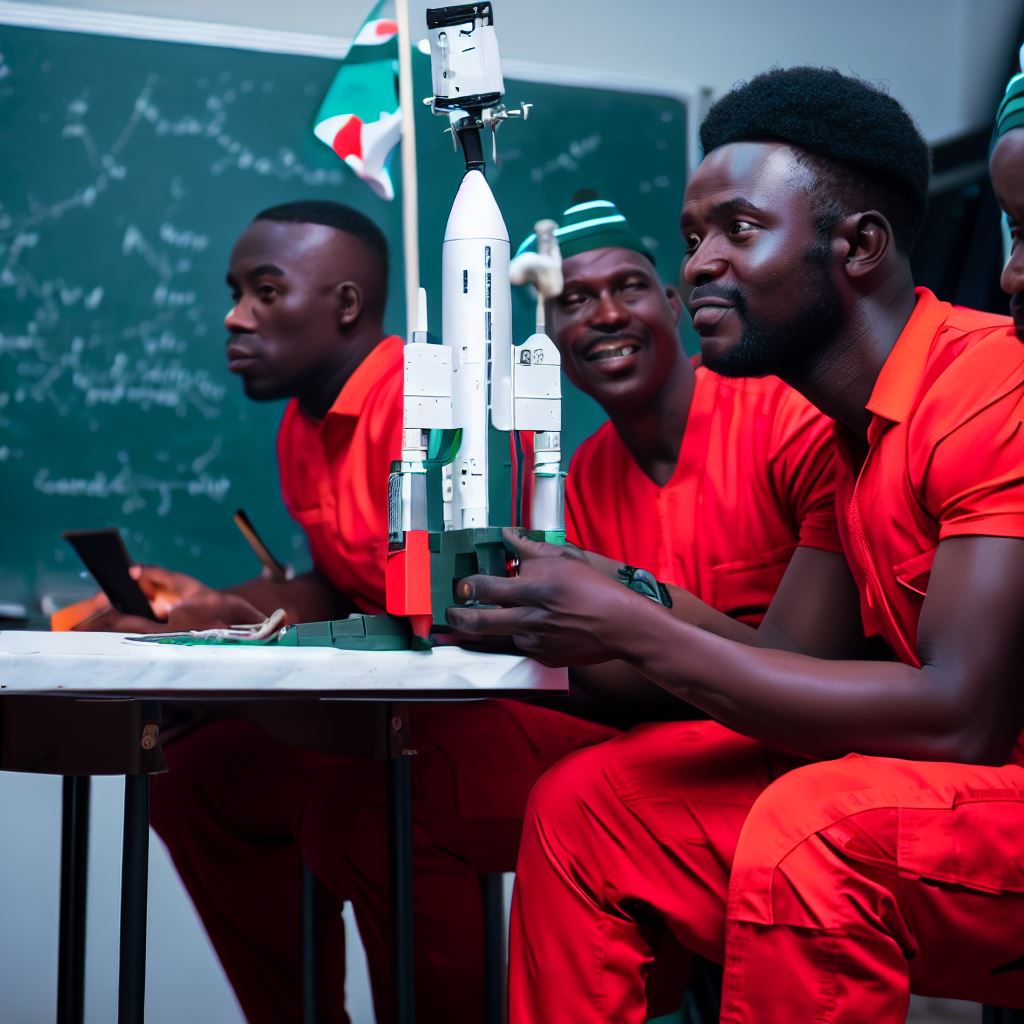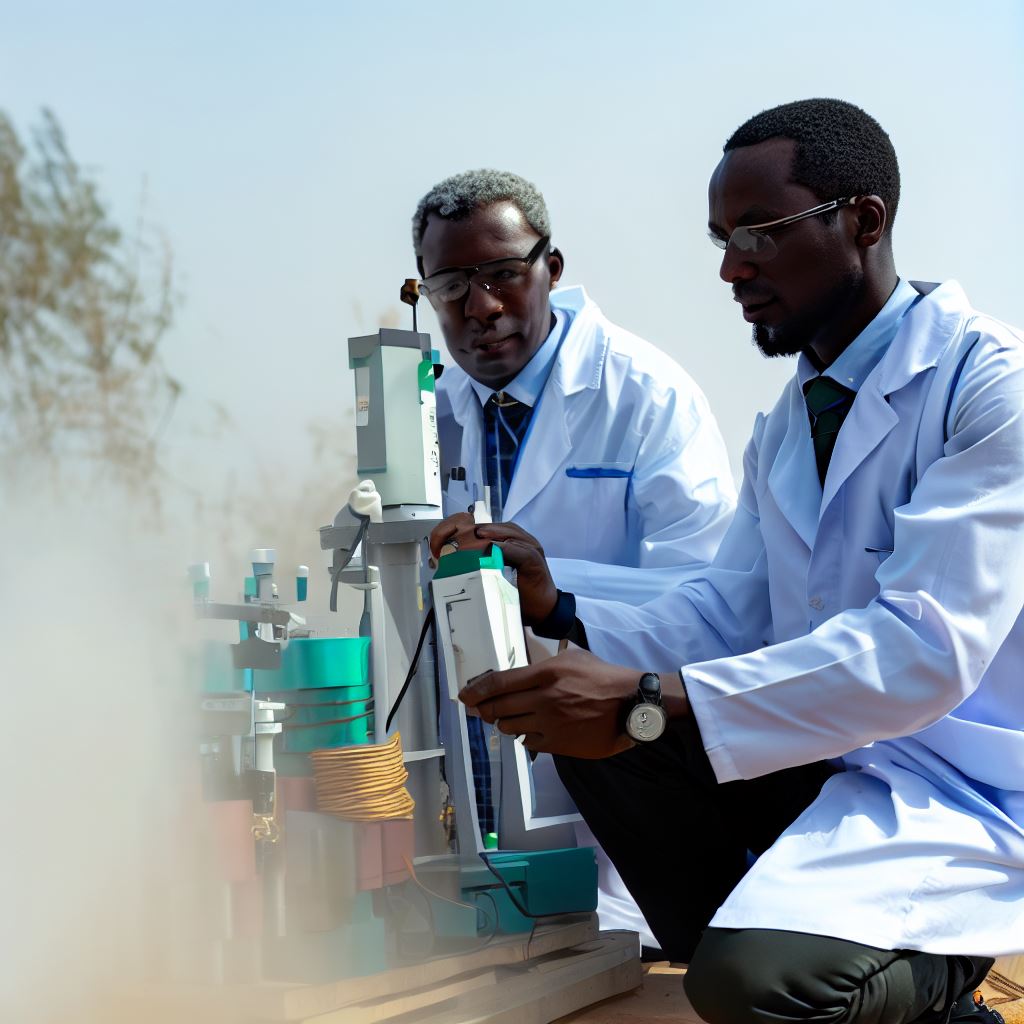Introduction
Nigeria has achieved notable success in space missions, exemplifying its progress in scientific and technological fields.
The launch of NigeriaSat-1 in 2003 marked a groundbreaking moment.
This satellite, designed for remote sensing and earth observation, facilitated resource management, environmental monitoring, and disaster response.
Later missions like NigeriaSat-2 and NigeriaSat-X expanded Nigeria’s space tech abilities, aiding agriculture, environment, disaster, and urban planning data collection.
Unsung heroes are the scientists and engineers behind missions, experts in aerospace engineering, astrophysics, and computer science.
These pioneers push boundaries, driving Nigeria’s success in space exploration.
Their dedication and innovation inspire future STEM professionals. Additionally, their contributions elevate Nigeria’s position in the global space community.
Collaborating with other nations and organizations, Nigerian scientists share knowledge and engage in cutting-edge research.
In fact, Nigeria’s space missions highlight its commitment to scientific advancement and global recognition.
Behind their success, dedicated scientists inspire future generations and strengthen Nigeria’s position in space exploration, emphasizing its boundless potential.
Overview of Nigeria’s space missions
A. The first Nigerian satellite, NigeriaSat-1
In 2003, Nigeria launched its first satellite, NigeriaSat-1, into space. The satellite was built by Surrey Satellite Technology Limited (SSTL) in the United Kingdom.
NigeriaSat-1 was designed for various purposes such as remote sensing and disaster monitoring.
It was equipped with high-resolution cameras and sensors to capture detailed images of the Earth.
NigeriaSat-1 was a significant milestone for Nigeria, as it marked the country’s entry into space technology.
The successful launch of NigeriaSat-1 opened up opportunities for further space exploration and scientific research.
B. Achievements and data gathered by NigeriaSat-1
NigeriaSat-1 provided valuable data for various sectors, including agriculture, environmental monitoring, and urban planning.
- The satellite’s high-resolution imagery was used to monitor and assess crop conditions across the country.
- It helped farmers to make informed decisions regarding irrigation, fertilization, and pest control.
- NigeriaSat-1 also played a crucial role in disaster management and emergency response.
- The satellite provided real-time information on natural disasters such as floods, wildfires, and oil spills.
- This data enabled authorities to coordinate effective relief efforts and minimize the impact of disasters on human lives.
- NigeriaSat-1 also contributed to scientific research in various fields.
- It assisted in the study of climate change, environmental degradation, and deforestation patterns in Nigeria.
- The satellite’s data was used by scientists to gain a better understanding of the Earth’s ecosystems and natural processes.
- The knowledge gained from NigeriaSat-1 helped policymakers in making informed decisions for sustainable development.
In short, Nigeria’s space missions, particularly the launch of NigeriaSat-1, have had a significant impact on various sectors.
The satellite’s capabilities in remote sensing and data gathering have provided valuable information for agriculture, disaster management, and scientific research.
Nigeria’s foray into space technology has marked the country’s progress and enhanced its global reputation in the field of space exploration.
With continued investments in space missions, Nigeria has the potential to further contribute to scientific advancements and socioeconomic development.
Read: Nigeria’s Space Programs: A Scientist’s Perspective
The Scientists Working on Nigeria’s Space Missions
A. Introduction to the Nigerian scientists involved
Nigeria’s space missions have captivated the world, and behind these groundbreaking projects are the brilliant minds of Nigerian scientists.
These individuals play a crucial role in the country’s space exploration endeavors and have made significant contributions to the field.
B. Dr. S.O. Mohammed and his contributions
One of the prominent scientists in Nigeria’s space missions is Dr. S.O. Mohammed.
With an exceptional educational background and expertise in astrophysics, he has been at the forefront of Nigeria’s space exploration journey.
1. Educational background and expertise
Dr. S.O. Mohammed holds a Ph.D. in astrophysics, making him well-equipped to delve into the complexities of space science.
He has dedicated years to studying celestial bodies and understanding the intricacies of the universe.
2. Notable projects and achievements
Dr. S.O. Mohammed has been involved in several notable projects, including the development of Nigeria’s first remote sensing satellite, NigSat-1.
His expertise in space technology has been instrumental in advancing Nigeria’s space capabilities.
C. The efforts of Dr. N.S. Onuoha
Another prominent figure in Nigeria’s space missions is Dr. N.S. Onuoha. With a background in aerospace engineering, he has played a vital role in the country’s pursuit of space exploration.
1. Background and role in Nigeria’s space missions
Dr. N.S. Onuoha comes from a strong aerospace engineering background, which has been invaluable in shaping Nigeria’s space endeavors.
His expertise in designing and developing space systems has significantly contributed to the country’s space program.
2. Noteworthy contributions and impact
Dr. N.S. Onuoha has made significant contributions to Nigeria’s space missions, particularly in satellite design and deployment.
His innovative approach and attention to detail have advanced the country’s capabilities in space technology, pioneering new frontiers.
In essence, Nigeria’s space missions would not be possible without the dedication and brilliance of its scientists.
Dr. S.O. Mohammed and Dr. N.S. Onuoha have left enduring marks on Nigeria’s space exploration with expertise and innovation.
Their work serves as an inspiration for aspiring scientists in Nigeria and around the world, showcasing the power of human ingenuity in unraveling the mysteries of the universe.
Read: Space Science in Nigeria: A Growing Field of Study

See Related Content: Corporate vs. Academic: Statisticians’ Paths in Nigeria
Challenges Faced by Nigerian Scientists in Space Missions
A. Limited funding and resources
Nigerian scientists working on space missions face the major challenge of limited funding and resources.
Without adequate financial support, it becomes difficult for them to carry out extensive research and develop advanced technologies needed for successful space missions.
The lack of proper infrastructure, equipment, and facilities further hampers their progress.
B. Lack of public awareness and support
Another significant challenge is the lack of public awareness and support for space missions in Nigeria.
Many people are unaware of the importance and potential benefits of space exploration, which leads to a lack of interest and support from the public.
This lack of awareness also affects the government’s willingness to allocate more funds for space research and development.
C. Collaboration and partnerships with international organizations
- Nigerian scientists face challenges in establishing collaborations and partnerships with international organizations.
- Space exploration is a highly specialized field that requires cooperation and exchange of knowledge with other countries.
- Limited collaboration opportunities hinder the growth and progress of Nigerian scientists in space missions.
- Without international partnerships, it becomes difficult to access advanced technologies and leverage the expertise of other countries.
Efforts are underway to address these challenges in Nigerian space missions.
The government and scientific institutions aim to boost funding for research and development. Increased resources will empower Nigerian scientists to pursue ambitious projects.
Growing recognition of public support importance for space missions leads to outreach campaigns.
These efforts educate the public about space exploration’s significance and can generate excitement and support, increasing mission funding.
Nigerian scientists pursue collaborations with global organizations for knowledge-sharing and resource access.
International partnerships offer expertise and speed up space mission progress.
Most importantly, Nigerian scientists involved in space missions face challenges in funding, public awareness, and international collaborations.
However, by increasing funding, creating public awareness, and establishing partnerships with international organizations, these challenges can be overcome.
With resources and support, Nigerian scientists can lead space exploration, propelling Nigeria to the forefront of missions.
Read: Atmospheric Science Jobs in Nigeria: A Guide
Future Prospects and Goals for Nigeria’s Space Missions
A. Overview of upcoming projects and ambitions
Nigeria has several exciting space projects planned for the future. One of the most significant upcoming missions is the NigeriaSat-2 and NigeriaSat-X satellites.
These satellites will provide important data for various sectors, including agriculture, disaster management, and security.
Nigeria also plans to launch the NigComSat-2 and NigComSat-3 satellites to improve communication networks in the country.
These ambitious projects demonstrate Nigeria’s commitment to advancing space technology and its applications.
B. Importance of continued support and investment in space technology
- Continued support and investment in space technology are crucial for Nigeria’s future growth and development.
- Space technology enables the country to acquire valuable data for informed decision-making and planning.
- It facilitates improved communication systems, weather forecasting, and resource monitoring.
- Investment in space technology can also create job opportunities and drive economic growth in related industries.
- Therefore, sustained support and investment are necessary to ensure the success and sustainability of Nigeria’s space missions.
C. Potential benefits for Nigeria and the African continent
Nigeria’s space missions hold immense potential for the country and the entire African continent.
- The data gathered from satellites can significantly enhance agriculture practices and food security.
- Satellite-based weather forecasting can help predict natural disasters and minimize their impact.
- Improved communication networks will connect remote areas and bridge the digital divide.
- Nigeria’s space missions can also inspire other African nations to invest in space technology and collaborate on future projects.
Overall, the benefits extend beyond Nigeria, positively impacting various sectors and promoting regional development.
Generally, Nigeria’s space missions have exciting upcoming projects and ambitious goals.
With satellites like NigeriaSat-2, NigeriaSat-X, NigComSat-2, and NigComSat-3, the country aims to gather valuable data for agriculture, disaster management, and communication networks.
Continued support and investment in space technology are vital for Nigeria’s growth and economic development.
Benefits extend to the entire African continent, including improved agriculture, weather forecasting, communication, and regional development.
Nigeria’s space missions signify its tech commitment and drive to advance Africa’s space exploration journey.
Read: Meet Nigeria’s Top Atmospheric Scientists: A Review
Conclusion
Throughout this blog section, we have shed light on the unsung heroes of Nigeria’s space program – the brilliant scientists who have made groundbreaking advancements.
Their contributions have not only put Nigeria on the map in the global space industry but have also inspired countless young minds.
By bringing attention to these scientists, we recognize their dedication and expertise, ensuring that they receive the recognition they deserve.
It is essential to acknowledge their hard work and passion as they continue to push the boundaries of space exploration.
If you find yourself fascinated by the achievements described in this blog section, we encourage you to dig deeper into the realm of Nigeria’s space missions.
Discover the stories of the scientists involved, their backgrounds, and the challenges they have overcome to propel Nigeria’s space program forward.
By learning about these individuals, we can appreciate their accomplishments and their impact on Nigeria’s scientific community and the nation.
Let’s celebrate their achievements and support their ongoing efforts.
In closing, behind every space mission’s success are passionate scientists propelling humanity toward limitless possibilities with dedication and expertise.




